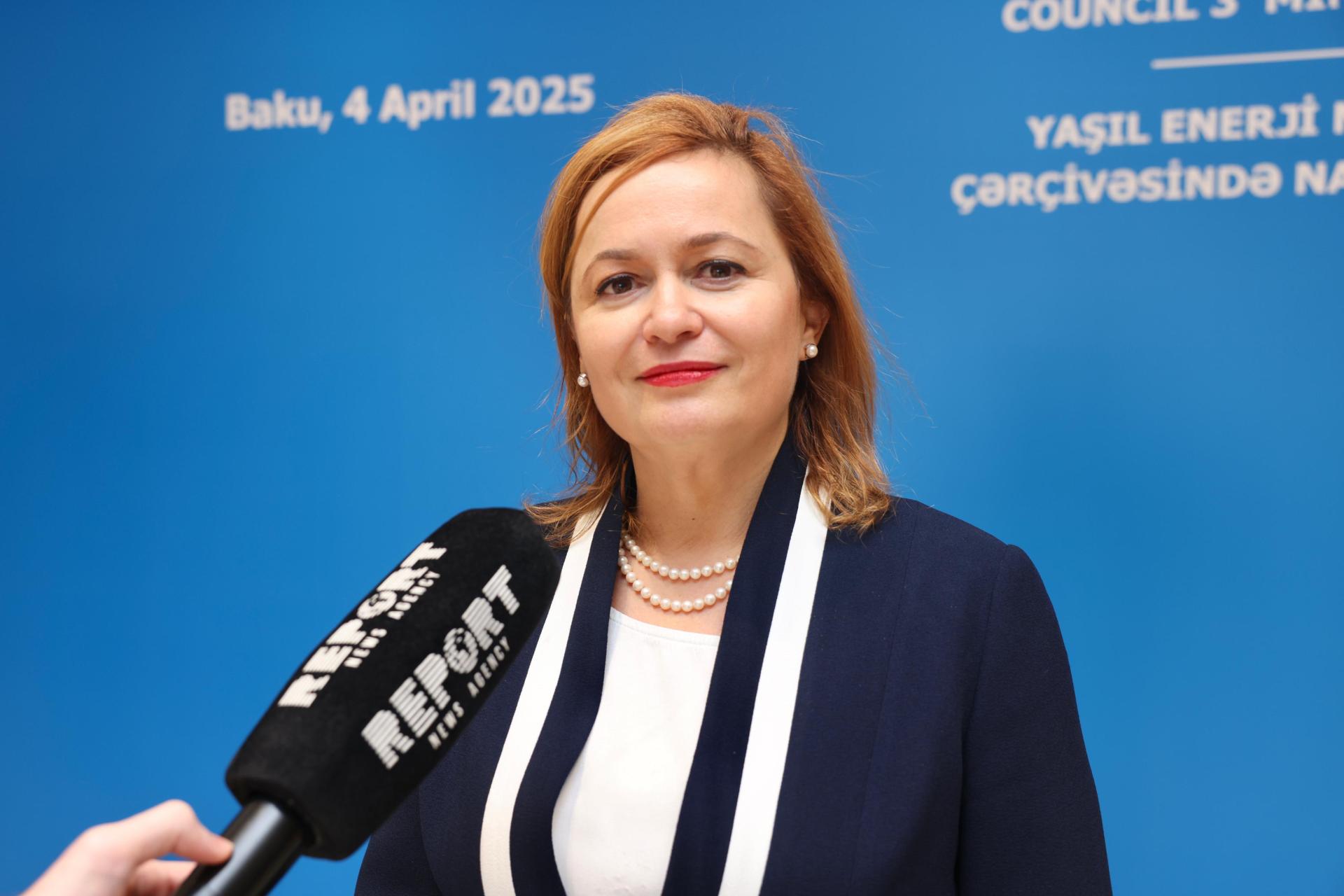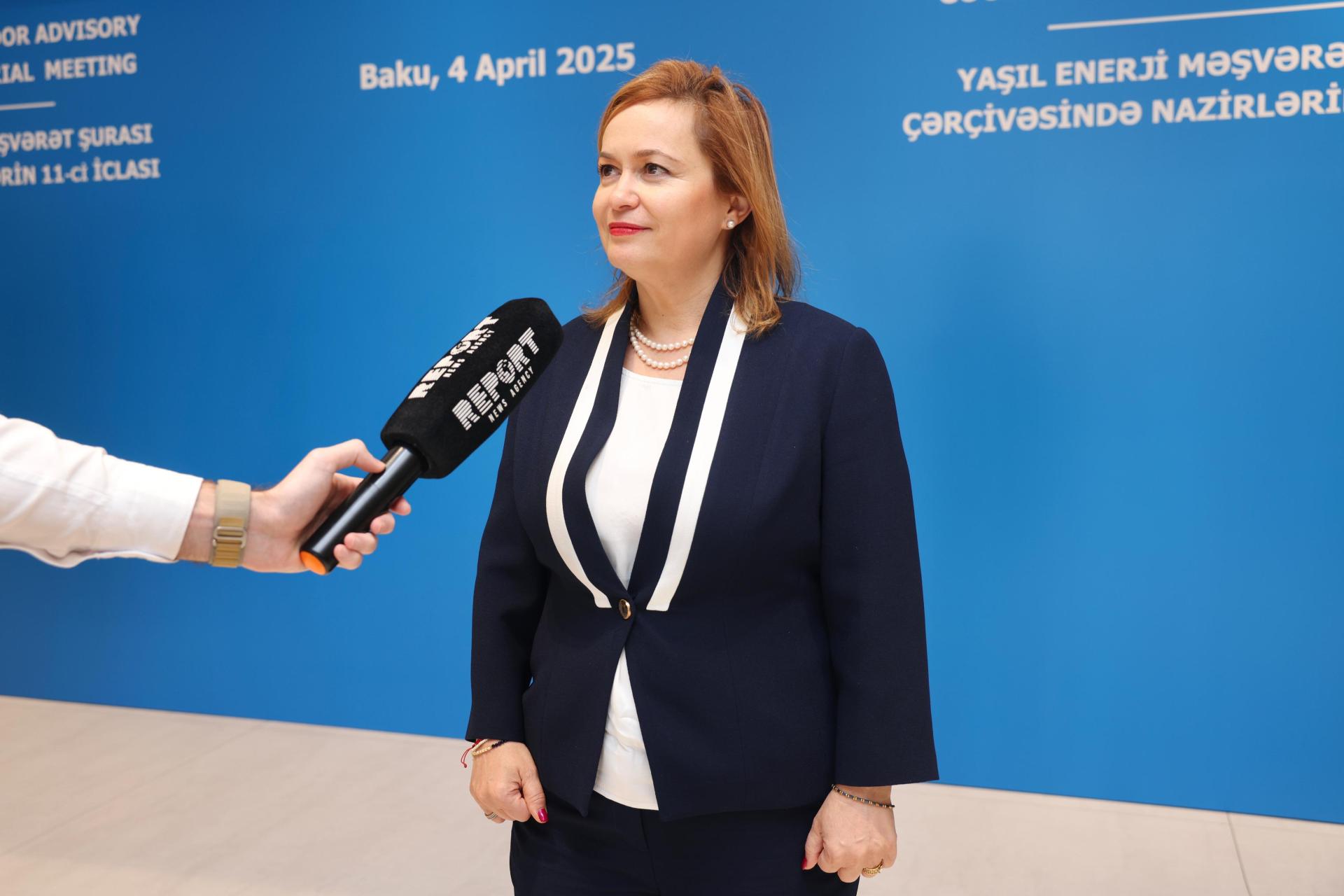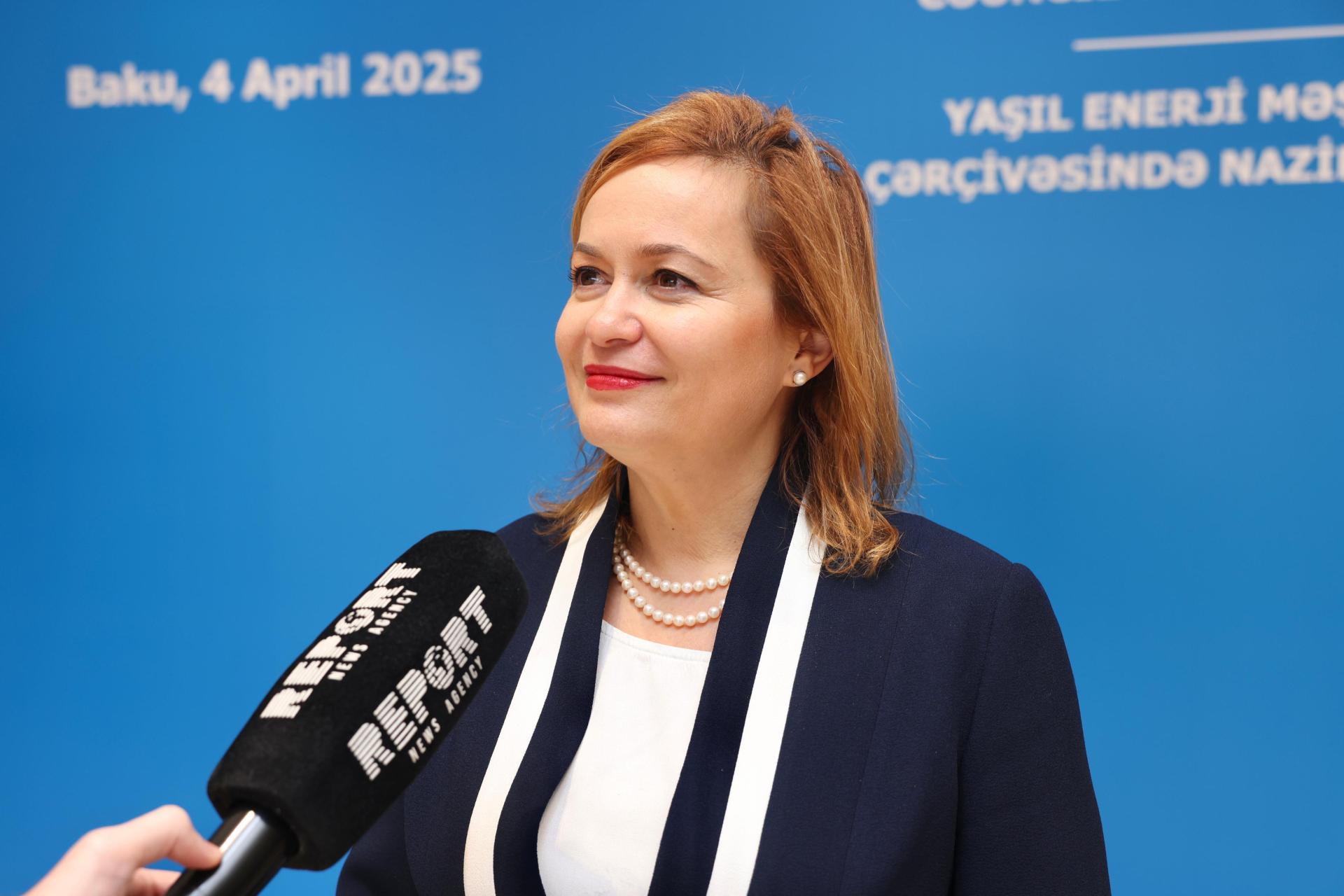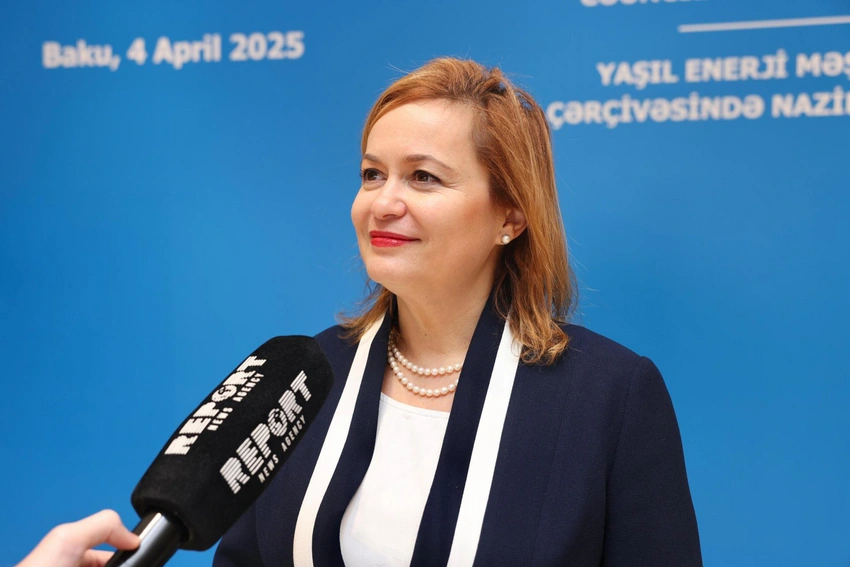The Gas Interconnector Greece - Bulgaria (IGB) has become an important element of the European energy architecture, providing diversification of gas sources and strengthening the energy resilience of the region. IGB physically connects the Southern Gas Corridor with the Trans-Adriatic Pipeline (TAP) and the Vertical Gas Corridor, creating a stable route for gas transportation from the Caspian region to Central and Eastern Europe.
In an interview with Report, Teodora Georgieva, executive officer in ICGB - the operator of IGB - spoke about the achieved results, prospects for infrastructure expansion, Azerbaijan's role in strengthening supplies, as well as challenges facing the project in the context of European Union policy.
Report presents the interview:
- How do you assess the operation of the IGB since its commissioning? What key results have been achieved during this time?
- IGB is part of the Southern Gas Corridor, and, accordingly, there is a crucial connection between the Caspian region, the Southern Gas Corridor, and IGB itself. Since its commissioning in 2022, it has become evident that IGB is one of the key elements in ensuring energy security and diversification of supplies, especially in conditions of global instability.
Bulgaria receives more than 40% of its gas from Azerbaijan, which has contributed to lower prices for both industry and consumers. IGB also demonstrates excellent synergy with the Trans-Balkan Pipeline, thanks to which significant volumes of gas were supplied to Moldova and Ukraine at a critical moment. This strengthens IGB's role as the foundation of regional energy security.
IGB is a unique infrastructure connected to the Trans-Adriatic Pipeline (TAP) and, therefore, is part of the Southern Gas Corridor. At the same time, we are connected to the system of the Greek operator DESFA, which makes us an element of the Vertical Gas Corridor and enhances Europe's energy connectivity. This also opens up prospects for gas supplies and transit through Moldova, Ukraine, and Central Europe.

We see enormous potential in this and hope that our reliable partnership with Azerbaijan Gas Supply Company (AGSC), as well as other Azerbaijani colleagues, will continue - as we perceive them not only as partners but also as friends.
- How loaded is IGB today? Has it reached its design capacity? What volumes of gas were transported in 2024 and since the beginning of the current year? What is the share of Azerbaijani gas in these supplies?
- In general, from the commissioning until March 1, 2025, more than 33 million MWh of gas has been transported through IGB in the direction from Greece to Bulgaria. The volume of supplies in the reverse direction - from Bulgaria to Greece through virtual reverse - amounted to about 2 million MWh. Unfortunately, I cannot provide data as of April 1 at the moment.
Against the background of changes in the energy market, especially after the start of the war, Azerbaijan plays a crucial role in ensuring the stability of supplies. The share of Azerbaijani gas in Bulgaria has already reached 40%, and in summer months up to 60%.
We plan to increase the capacity of IGB from 3 to 5 billion cubic meters. However, the current European Union policy does not contribute to the development of gas infrastructure. Without grants, the task becomes extremely difficult, especially given insufficient market demand. We count on additional financial assistance and subsidies, as increasing capacity is our priority. Expanding IGB is a long-term investment in Europe's sustainability. Design, permitting, and preparation of tender documentation are already in the preparation process. This step will allow increasing the volume of Azerbaijani gas supplies to European markets, improve reverse capabilities, and strengthen energy connectivity between EU countries and Energy Community partners.
This is not just modernization - it's a strategic investment in diversification, sustainability, and solidarity.
In addition to contracts with AGSC, SOCAR is also actively participating in the market, developing gas distribution. The company also cooperates with Asarel - a key market player, and is considering expanding the partnership. All this confirms: SOCAR sees Bulgaria as a strategic partner, and we fully share this confidence.
- What specific steps have already been taken regarding the expansion of IGB capacity? Is there an approximate cost estimate for the project?
- We have already started the preparatory phase for the expansion of the infrastructure: work is underway on the design, obtaining permits and preparing tender documentation to increase the capacity to 5 billion cubic meters per year. This expansion is not just a technical upgrade, but a strategic investment in the sustainability and connectivity of the European gas system.

The cost of the project is estimated at approximately 15 million euros. The compressor station falls under DESFA's responsibility, so our capital expenditures are minimal. However, even with a relatively small amount, we strive to maintain competitiveness.
We consider the optimal financing scheme to be sequential: first - grants, then - attracting financing, and, lastly, shareholder investments. This will help maintain the sustainability of the Southern and Vertical Gas Corridors.
We also value the information received at the 11th Southern Gas Corridor Advisory Council Ministerial Meeting and 3rd Green Energy Advisory Council Ministerial Meeting - about the emergence of new gas volumes, including supplies not only from the Shah Deniz-2 field. If additional volumes appear in the Southern Gas Corridor, this will become a significant argument in favor of expansion.
We are confident that Azerbaijani partners are the most reliable. Increasing supplies through IGB on a sustainable basis will strengthen the justification for this project.
- Why is the enlargement of the IGB of pan-European significance?
- IGB is not only a cornerstone element of the Southern Gas Corridor, but also an important part of integration with the Vertical Gas Corridor. It is key infrastructure physically connecting the Southern Gas Corridor with TAP, as well as with the Vertical Corridor system. This connection makes IGB a strategic link for transporting Azerbaijani gas from the Caspian region to Southeastern, Central, and Eastern Europe.
IGB also provides gas supplies from Ukraine and Moldova through the Trans-Balkan pipeline.
Thanks to integration with the Bulgarian national gas network and the Trans-Balkan route, IGB allows for reverse flow of Azerbaijani gas toward Ukraine and Moldova, providing much-needed alternative and secure supply routes. The synergy between the Southern Gas Corridor, IGB, and the Trans-Balkan direction forms a strategic lifeline for a region under serious geopolitical and energy pressure.
In this context, expanding IGB capacity is significant not only for national but also for pan-European energy security in the long term. ICGB company is fully committed to providing reliable, flexible, and scalable supplies.
We have sustainable market demand and confirmed operational success: since the start of operations in 2022, IGB has reached 80% utilization of its capacity - this is clear evidence of the high level of market confidence in our infrastructure.
- What is the role of the European Union in the process of IGB expansion and support for gas infrastructure in general?
- Here, I would like to highlight a certain contradiction in EU policy that complicates our efforts. On the one hand, natural gas continues to be seen as a transition fuel, playing an important role in ensuring supply stability and supporting the integration of renewables. On the other hand, many European financial instruments – such as the EPR, CEF and RepowerEU – effectively exclude gas infrastructure from priority projects, especially if they are not considered critical or do not have a guaranteed market demand.

This poses a major challenge. Without direct support, it is extremely difficult for projects like the IGB to remain competitive and scale up their infrastructure. We at the ICGB call for a review of the EU’s approach to ensure more flexible and realistic funding models. This is especially true for transition projects that have geopolitical and regional significance, as is the case here.
Natural gas will remain an important part of Europe’s energy mix for a long time to come. It helps replace more carbon-intensive fuels, balance the system when integrating renewable energy sources, and ensure security of supply in a highly volatile market. This is why gas projects need a sustainable commercial model and access to grants, subsidies, and other forms of support.
In 2023-2024, we completed a key milestone - the coordination with neighboring operators within the Vertical Gas Corridor. This was an important step, but the EU still requires long-term capacity bookings as a precondition for investment, which no longer corresponds to market realities. This practice hinders the development of flexible infrastructure.
A more adaptive and flexible model is needed to attract investment in priority infrastructure such as the IGB. Let me emphasize once again: we are part of a corridor of strategic importance for the whole of Europe. The integration of the Southern and Vertical Gas Corridors via the IGB, as well as the connection to the Trans-Balkan route, form a robust infrastructure network that ensures energy security from the Caspian region to Central Europe.
The IGB has proven its reliability and efficiency, and we count on the support of all stakeholders - from national governments and operators to European institutions. Only through joint efforts can we ensure the long-term sustainability, scalability and strategic importance of our infrastructure in the context of the energy transition and geopolitical challenges.


 https://images.report.az/photo/3d75d2f9-20ea-3356-a815-8bcc35625187.jpeg
https://images.report.az/photo/3d75d2f9-20ea-3356-a815-8bcc35625187.jpeg

